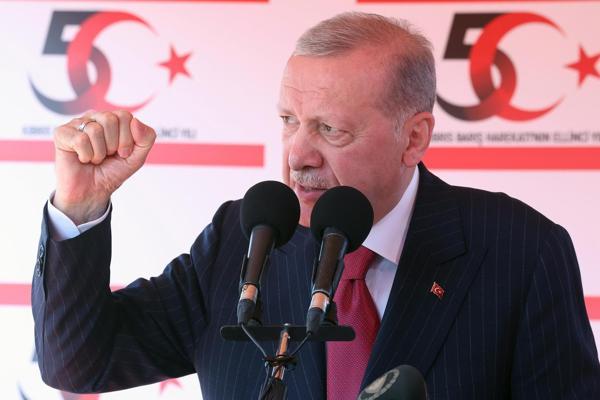Erdoğan reaffirms two-state solution for Cyprus
NICOSIA


President Recep Tayyip Erdoğan has reiterated his stance that a two-state solution is the only viable path forward for the divided island of Cyprus.
"No one has the power to see and show the Turkish Cypriot people, who are the essential element of the island, as a minority," Erdoğan told journalists aboard his plane from Cyprus on July 20.
The president and a large delegation were on the island to attend a ceremony to mark the 50th anniversary of a Turkish military operation there.
Türkiye's operation launched five days after a coup orchestrated by the junta then in power in Athens sought to unite the whole island with Greece.
"It becomes clearer day by day that the two-state model is the only solution to the Cyprus issue," Erdoğan said. "We will continue to fight with determination for the recognition of the Turkish Republic of Northern Cyprus and the implementation of a two-state solution."
The rejection of a U.N. peace plan by Greek Cypriot voters in a 2004 referendum meant the Greek Cypriot administration entered the European Union that year still as a divided island, with Turkish Cypriots denied the full benefits of membership.
The northern part is recognized only by Ankara.
"A federal solution in Cyprus is not possible, this is what we believe," Erdoğan said ahead of a military parade in Nicosia on July 20.
"The Turkish Cypriot side, as equals with the Greek side, are willing to negotiate and are ready to sit down and negotiate. If you want a solution, you need to recognize the rights of Turkish Cypriots."
U.N.-backed efforts to reunify the island as a bizonal and bicommunal federation have stalled since the last round of talks collapsed in 2017.
The president also praised the presence of main opposition Republican People's Party (CHP) leader Özgür Özel at the event, highlighting it as a sign of Turkey's unified stance on the Cyprus issue.
In response to a journalist's question on board, Erdoğan criticized Greek Defense Minister Nikos Dendias' description of the 1974 operation as an "invasion," calling it "irresponsible and immoral."
"Mr. [Greek Prime Minister Kyriakos] Mitsotakis needs to put this minister in his place. We don't need to talk much more anyway," he added.
The anniversary came amid a thaw in relations between the neighbors, initiated during a meeting between Erdoğan and Mitsotakis at a NATO summit last July.
Meanwhile, Turkish Cypriot leader Ersin Tatar said Turkish Cypriots reject “domination” by the Greek Cypriot majority and seek “equal national status” for their state.
He added that there's now “no common ground” for a return to peace negotiations.
Referring to a recent resolution in the Ankara parliament calling for a two-state solution, Tatar said it “will help us and our cause incredibly.”
In a seperate event, the island's Greek Cypriot president, Nikos Christodoulides, said he remains committed to resuming peace talks to reunify the island as a federation.
But Christodoulides said he wouldn’t sign up to any agreement that either foresees a two-state arrangement or is unworkable and doesn’t guarantee rights afforded to any other EU citizen.
Speaking at the same gathering, Mitsotakis said there's no other option than to resume talks. “One who isn’t in the right and has no arguments to make evades dialogue,” he said.
